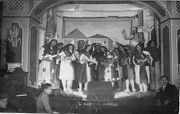Play (theatre)

| Performing arts | |
|---|---|
|
Major forms
|
|
|
Minor forms
|
|
|
Magic · Puppetry |
|
|
Genres
|
|
|
Drama · Tragedy · Comedy · Tragicomedy · Romance · Satire · Epic · Lyric |
|
| Literature |
|---|
|
Major forms
|
|
Novel · Poem · Drama |
| Genres |
|
Epic · Lyric · Drama |
| Media |
|
Performance (play) · Book |
| Techniques |
|
Prose · Verse |
| History and lists |
|
Outline of literature |
| Discussion |
A play is a form of literature written by a playwright, usually consisting of scripted dialogue between characters, intended for theatrical performance rather than just reading. There are rare dramatists, notably George Bernard Shaw, who have had little preference whether their plays were performed or read. The term "play" can refer to both the written works of playwrights and to their complete theatrical performance.[1]
Contents |
History
The earliest recorded theatrical event dates back to 2000 BC with the passion plays of Ancient Egypt. This story of the god Osiris was performed annually at festivals throughout the civilization, marking the known beginning of a long relationship between theatre and religion.
In Western culture, the play originated in Ancient Greece and was popular through Roman times.[2] They began to fade from popularity until the late 16th century, when Shakespeare popularised theatres and plays. His influence on this literary form, and the English language, is still apparent today.[3]
Shakespeare may, in fact, have helped introduce the play to England, as before the late 1500s there were no set plays in England, just wandering minstrels performing scenes on request.[4]
The history of plays in Eastern theatre is traced back to 1000 BC with the Sanskrit drama of ancient Indian theatre. The earliest plays in Chinese theatre also date back to around the same time. Japanese forms of Kabuki, Noh, and Kyogen date back to the 17th century. Other Eastern forms were developed throughout China, Korea, and Southeast Asia.
The most popular plays in the medieval Islamic world were passion plays known as ta'ziya, where actors re-enact episodes from Muslim history. In particular, Shia Islamic plays revolved around the shaheed (martyrdom) of Ali's sons Hasan ibn Ali and Husayn ibn Ali. Live secular plays were known as akhraja, recorded in medieval adab literature, though they were less common than ta'ziya plays.[5]
Genres
Comedy
Comedies are plays which are designed to be humorous. Comedies are often filled with witty remarks, unusual characters, and strange circumstances. Certain comedies are geared toward different age groups. Comedies were one of the two original play types of Ancient Greece, along with tragedies.[6][7]
Farce
A generally nonsensical genre of play, farces are often overacted and often involve slapstick humour.[7]
Satirical
A satire is a play which takes a comic look at current events and famous people while at the same time attempting to make a political or social statement, for example pointing out governmental corruption.[8]
Tragedy
These plays often involve death and are designed to cause the reader or viewer to feel sadness. Tragic plays convey all emotions, and have extremely dramatic conflicts. Tragedy was one of the two original play types of Ancient Greece.[6]
Historical
These plays focus on actual historical events. They can be tragedies or comedies, but are often neither of these. History as a separate genre was popularised by William Shakespeare.[9]
Terminology
The term "play" can be either a general term, or more specifically refer to a non-musical play. Sometimes the term "straight play" is used in contrast to "musical", which refers to a play based on music, dance, and songs sung by the play's characters. For a short play, the term "playlet" is sometimes used.
See also
Lists
- List of basic theatre topics
- List of Canadian plays
- List of films based on stage plays or musicals
- List of plays made into feature films
Related topics
- Closet drama
- Drama
- Dramatis personæ
- Playwright
- Theatre
- History of theatre
- Screenplay
- Musical theatre
References
- ↑ "Play": Dictionary.com website. Retrieved on January 3, 2008.
- ↑ "THE ENGLISH DRAMA.; A LECTURE ON ITS ORIGIN AND RI... - View Article - The New York Times" (PDF). query.nytimes.com. http://query.nytimes.com/mem/archive-free/pdf?_r=1&res=9A01EEDF1630EE3ABC4A51DFB366838B699FDE&oref=slogin. Retrieved 2008-06-17.
- ↑ "Shakespeare's Influence". shakespeare.about.com. http://shakespeare.about.com/library/weekly/aa042400a.htm. Retrieved 2008-06-17.
- ↑ "Elizabethan Theatre". www.globe-theatre.org.uk. http://www.globe-theatre.org.uk/elizabethan-theatre.htm. Retrieved 2008-06-20.
- ↑ Moreh, Shmuel (1986). "Live Theater in Medieval Islam". In David Ayalon, Moshe Sharon. Studies in Islamic History and Civilization. Brill Publishers. pp. 565–601. ISBN 965264014X
- ↑ 6.0 6.1 "THE ANCIENT GREEK DRAMA & THEATRE HISTORY PAGE". anarchon.tripod.com. http://anarchon.tripod.com/indexGREEKTH.html. Retrieved 2008-06-16.
- ↑ 7.0 7.1 "Origin of Comedy". www.theatrehistory.com. http://www.theatrehistory.com/ancient/bates001.html. Retrieved 2008-06-16.
- ↑ "satire - Definitions from Dictionary.com". dictionary.reference.com. http://dictionary.reference.com/browse/satire. Retrieved 2008-06-16.
- ↑ "The Three Richards: Richard I ... - Google Book Search". books.google.co.uk. http://books.google.co.uk/books?id=V3b2tlWBBUsC&pg=PA11&lpg=PA11&dq=%22Shakespeare+popularised%22+historical+play&source=web&ots=sx14K1ufcZ&sig=aQYDQp05iYxj-PFeE2JUGU1FyJ4&hl=en&sa=X&oi=book_result&resnum=1&ct=result. Retrieved 2008-06-17.
|
|||||||||||||||||||||||||||||||||||